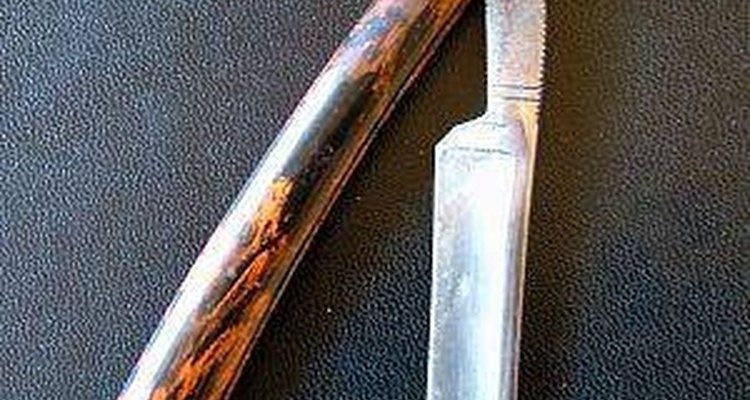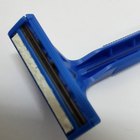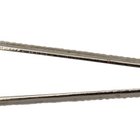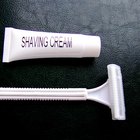
How It Works
A simple straight razor lifts the hair up and pulls it out of the follicle, then shaves the hair closely so that when it is cut off, it slips back under the surface of the skin.
Safety razors were developed to combine the effectiveness of the straight-edge razor with the safety of having all but the very tip of the cutting edge of the blade covered. Completely disposable safety razors have been available since the mid-1970s and come in a variety of models, including single-blade, double-blade systems, multi-blade, and those with moisturizer surrounding the blade. Multiple-blade systems encourage a close shave, as each successive blade catches what the previous blade did not. Safety razors with pivoting heads claim to prevent more nicks and facial cuts than those that do not pivot. Disposable cartridge and disposable blade systems are available as well, for the eco-minded shaver.
Electric shavers work like scissors: A non-corrosive mesh grabs the beard while the internal rotary blade slices the shaft of the hair. This may not cut as close as a straight blade, as the mesh brings a distance between the skin and the cutting blade. Some electric blades work in conjunction with a special lotion or oil that keeps the hair shaft erect so that it is easier to shave.
Why Men's Razors Are Sharper
Men's razors tend to be sharper than women's razors, and some women claim that they actually work better than women's razors. Men's razors may be sharper for several reasons: Men have more hair in a smaller area than women do, so a sharper blade is needed to cut through the additional stubble. Also, men's facial stubble may be coarser than leg hair, and women tend to have softer skin than men, prompting a need for a more delicate razor.
History
Ancient razors have been found in Egypt dating to earlier than 2600 BC. A writer between the years 100 and 200 likened shaving to happiness, which indicates that razors were used throughout antiquity.
In medieval Europe the barber practiced surgery as well. The alternating red and white stripe on the barber pole signified that the barber was a bloodletter; the colors symbolized the clean bandages mingling with the blood of the patient.
The long, sharp blade of Sweeney Todd fame was used in barbershops in the 18th and 19th centuries. The wealthy could afford to get a shave in the 1700s and 1800s, although regular shaving didn't become fashionable until the 1900s.
Although the first safety razor was developed in the late 19th century, the first one with replaceable blades was developed by Gillette in the early 20th century. The same basic design continues to sell millions of units to this day. Jacob Schick is credited with developing the first electric razor; he was inspired by the mechanics of military weaponry.
Other Benefits
Men report soft and dewy facial skin, because the razor exfoliates every time they shave.
Dangers
In addition to the obvious dangers of the straight blade, the electric razor can pose a threat if the mesh is corroded or damaged in any way.
Related Articles

Glycolic Acid & Razor Bumps

What Happens When You Shave?

Treatment of Razor Bumps for Black Women

How to Remove Hair Follicles to Prevent ...

How to Remove the Blade on a Schick ...

How to Get a Closer Electric Shave

How to Treat an Ingrown Eyebrow Hair

What Is the Difference Between Cutting ...

How to Not Get Stubble When Shaving ...

Shaving Armpits the Correct Way

How to Get Smooth Shaved Legs When Hair ...

Male Model Grooming Tips

How to Clear Up Red Bikini Line Bumps

The Differences Between Men's & Women's ...

Hyperpigmentation and Shaving

How to Keep From Getting Ingrown Armpit ...

Schick Quattro Instructions

How to Prevent Underarm Bumps

The History of the Gem Safety Razor

Proper Way to Shave a Mustache
Photo Credits
Webshots shareware image